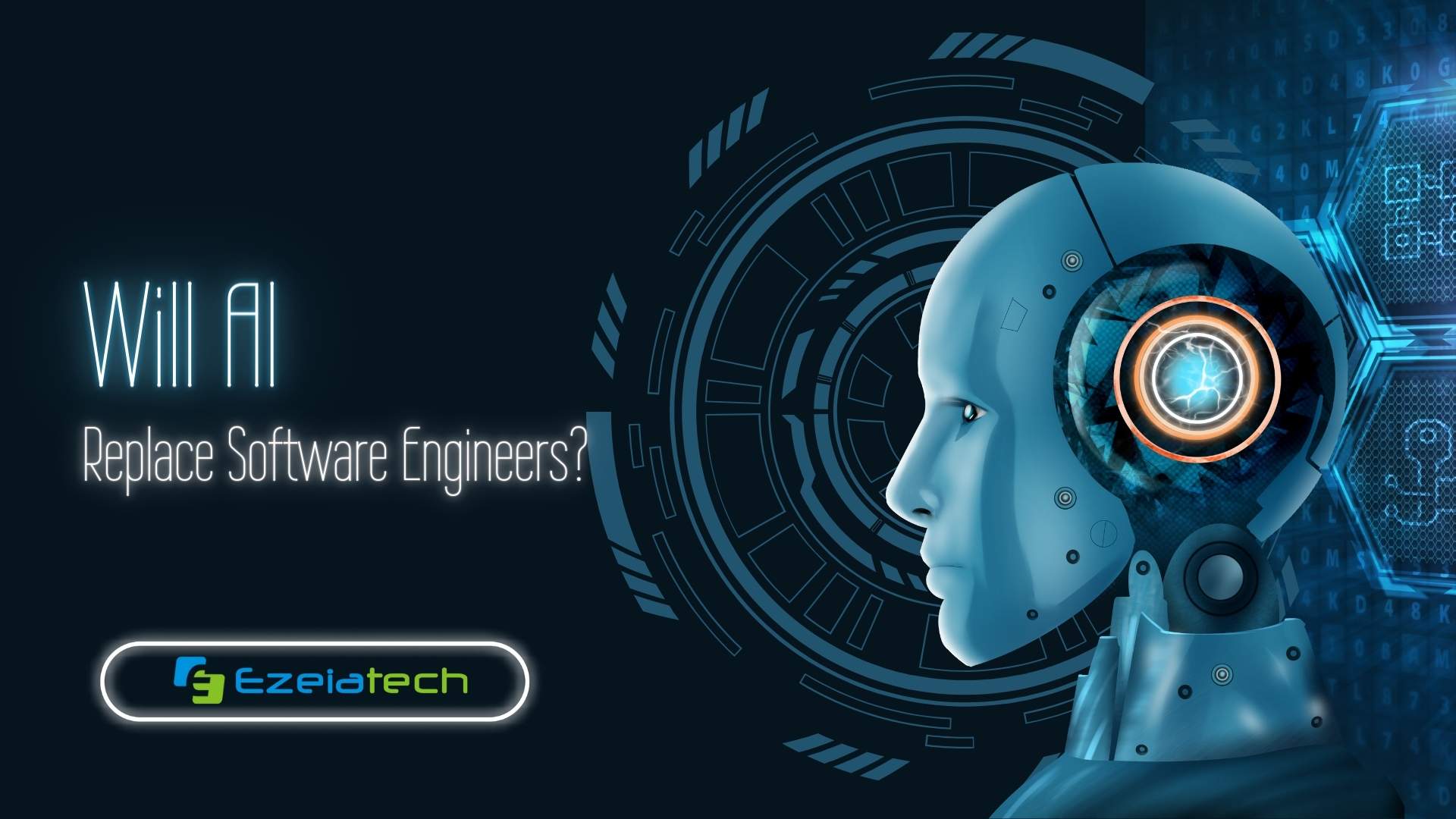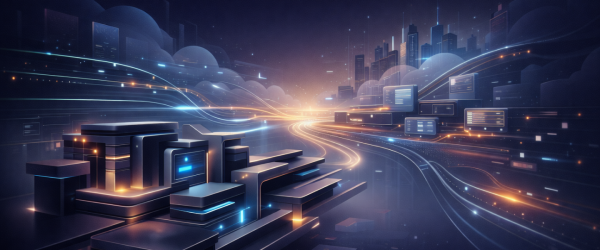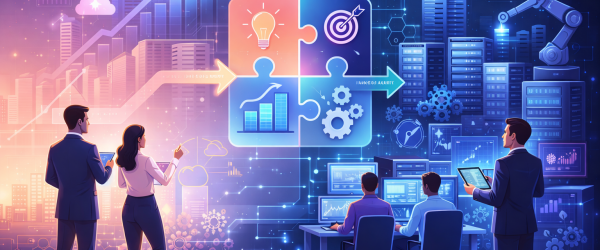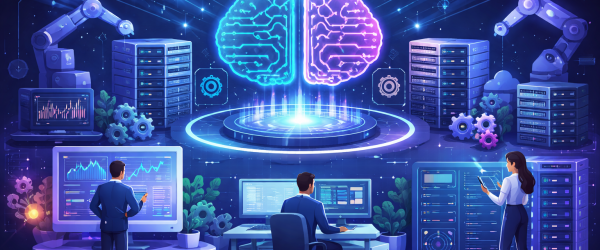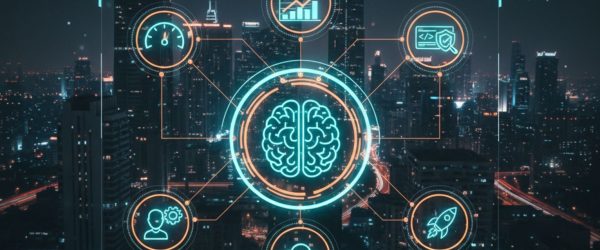Artificial Intelligence (AI) is revolutionizing many industries, including software development. The question on everyone’s mind is: “Will AI replace software engineers?” This topic is not only pertinent but also crucial for understanding the future of software engineering and the job market. The rise of AI tools and their increasing capabilities pose significant implications for the industry, raising concerns and sparking debates among professionals and enthusiasts alike.
Growing Influence of AI in Software Engineering
The software development landscape is rapidly evolving with the integration of AI. AI is projected to automate about 25% of all software development processes by 2025. This statistic underscores the importance of understanding how AI is influencing software engineering roles and the potential future scenarios.
Dual Nature of AI’s Impact
AI in software development offers numerous benefits, such as improved efficiency and accuracy. For instance, AI-powered tools like GitHub Copilot and OpenAI Codex can generate code snippets, assist with debugging, and streamline project management tasks. These tools can handle repetitive and time-consuming tasks, allowing software engineers to focus on more complex and creative aspects of development.
However, the growing capabilities of AI also bring challenges. The fear of job displacement is real, as AI can potentially take over certain aspects of software engineering. According to a study by McKinsey, up to 30% of the tasks in 60% of occupations could be automated, highlighting the potential for significant shifts in job roles.
Understanding AI and Software Engineering
In order to fully grasp the potential for AI to replace software engineers, it’s essential to first understand both AI and software engineering, including their definitions, types, roles, and responsibilities.
Definition of Artificial Intelligence (AI)
Artificial Intelligence (AI) refers to the simulation of human intelligence in machines designed to think and act like humans. AI systems are capable of learning from experience, adapting to new inputs, and performing tasks that typically require human intelligence.
Overview of Software Engineering
Software engineering is the application of engineering principles to the design, development, maintenance, testing, and evaluation of software and systems. Software engineers use systematic, disciplined, and quantifiable approaches to ensure that software systems are reliable, efficient, and meet user needs.
Roles and Responsibilities of Software Engineers
Software engineers play a vital role in the tech industry, handling a variety of tasks that include:
- Requirement Analysis: Understanding and documenting user needs and requirements.
- Design and Development: Creating software architecture, writing code, and developing applications.
- Testing and Debugging: Ensuring the software is free of bugs and functions as intended.
- Maintenance and Updates: Regularly updating software to fix issues, add features, and improve performance.
- Project Management: Overseeing the software development process, managing teams, and ensuring project timelines and goals are met.
Understanding the distinct roles and capabilities of AI and human software engineers is crucial to evaluating whether AI can replace software engineers.
Current State of AI in Software Development
To understand the extent to which AI can replace software engineers, it’s important to examine the current state of AI in software development. This includes looking at various AI tools and technologies in use today and assessing their benefits and limitations.
Examples of AI Tools and Technologies in Software Development
AI tools are increasingly becoming integral to the software development process. Here are some notable examples:
Code Generation Tools
- GitHub Copilot: Powered by OpenAI Codex, GitHub Copilot can suggest code snippets and complete lines of code based on the context of the current development environment. This tool aids developers in writing code faster and with fewer errors.
- OpenAI Codex: This AI model can translate natural language prompts into code, making it a powerful assistant for developers, especially in generating boilerplate code and performing routine coding tasks.
Automated Testing and Debugging Tools
- Testim: An AI-powered tool that automates the creation and maintenance of software tests. Testim helps ensure that software is reliable and functions correctly by identifying and fixing bugs quickly.
- DeepCode: This tool uses AI to review code for potential bugs and vulnerabilities, offering suggestions for improvements based on a vast database of code patterns.
Project Management and Code Review Tools
- JIRA Software: While not purely an AI tool, JIRA incorporates machine learning to predict project timelines and help manage development tasks more effectively.
- DeepCode Review: An AI-based tool that analyzes code for style and consistency, offering recommendations to improve code quality and maintainability.
Benefits of AI Tools in Software Development
AI tools offer several advantages that can significantly enhance the software development process:
- Speed and Efficiency: AI tools can perform repetitive and time-consuming tasks faster than humans. For example, AI can generate and test code quickly, allowing developers to focus on more complex problems.
- Accuracy and Precision: AI can identify patterns and errors in code that may be missed by human developers, leading to fewer bugs and more reliable software.
- Enhanced Productivity: By automating routine tasks, AI tools free up time for developers to engage in creative and strategic activities, ultimately boosting overall productivity.
Limitations of Current AI Tools
Despite their benefits, AI tools in software development have limitations that need to be acknowledged:
- Context Understanding: AI tools often lack the ability to fully understand the context and nuances of a project. This can lead to inappropriate or suboptimal code suggestions.
- Creativity and Innovation: While AI can assist with routine tasks, it cannot match the creativity and innovative thinking of human developers.
- Dependency on Quality Data: AI models require high-quality, large datasets for training. Poor quality or biased data can lead to inaccurate or biased results.
Understanding these benefits and limitations helps in assessing the potential for AI to replace software engineers. While AI tools enhance efficiency and productivity, they currently complement rather than replace the human aspects of software engineering.
AI Capabilities vs. Human Capabilities
As we continue to explore whether AI will replace software engineers, it is essential to compare the capabilities of AI and human software engineers. Understanding the strengths and weaknesses of each will provide insights into their respective roles in the software development industry.
Strengths of AI in Software Development
AI has several strengths that make it a valuable asset in software development. Here are some key advantages:
- Speed and Efficiency: AI can process vast amounts of data and perform repetitive tasks much faster than humans. This efficiency is particularly beneficial in tasks like code generation and testing, where speed is crucial.
- Handling Repetitive Tasks: AI excels at automating routine and repetitive tasks, such as code completion, debugging, and test generation. This automation reduces the burden on human developers and allows them to focus on more complex and creative tasks.
- Pattern Recognition and Data Analysis: AI’s ability to analyze large datasets and recognize patterns is unparalleled. This capability is useful in identifying bugs, optimizing code, and predicting project outcomes based on historical data.
Unique Strengths of Human Software Engineers
While AI brings significant advantages, human software engineers possess unique strengths that AI currently cannot replicate:
- Creativity and Innovation: Human developers excel at thinking creatively and coming up with innovative solutions to complex problems. This creativity is crucial for designing user-friendly applications and developing novel features that meet user needs.
- Problem-Solving and Critical Thinking: Human engineers can understand the broader context of a project and make decisions based on a deep understanding of the problem. Their critical thinking skills allow them to navigate ambiguous situations and devise effective solutions.
- Understanding Context and User Needs: Human developers have the ability to comprehend the context in which software is used and empathize with user needs. This understanding ensures that the software is not only functional but also user-friendly and aligned with business objectives.
What Challenges Does Generative AI Present?
Generative AI, which includes models like GPT-3 and GPT-4, presents several challenges in software development:
- Contextual Limitations: Generative AI often struggles with understanding the specific context of a project. It may produce code that is syntactically correct but semantically inappropriate for the given task.
- Quality and Reliability: The quality of AI-generated code can vary. Without thorough review and testing, AI-generated code may introduce bugs or vulnerabilities.
- Bias and Fairness: AI models can inherit biases present in their training data. This can lead to biased code suggestions and unfair outcomes, especially in applications that impact diverse user groups.
Can Generative AI Replace Software Engineers?
Given the current capabilities and limitations of AI, it is unlikely that AI will completely replace software engineers in the near future. Instead, AI is more likely to serve as a powerful tool that enhances the productivity and capabilities of human developers.
AI tools can take over routine and repetitive tasks, allowing software engineers to focus on creative and complex problem-solving. The combination of AI and human expertise can lead to more efficient and innovative software development processes.
Potential Impact on Software Engineering Jobs
The integration of AI in software development is set to significantly impact software engineering jobs. By examining both short-term and long-term effects, we can gain a better understanding of how AI will reshape the industry and the roles of software engineers.
Short-Term Impact
In the short term, AI is likely to enhance productivity and shift roles and responsibilities within software development teams.
Enhancement of Productivity
AI tools can automate routine tasks such as code generation, debugging, and testing. This automation allows software engineers to focus on more complex and creative tasks, improving overall productivity. For example, AI tools like GitHub Copilot can assist developers in writing code faster and with fewer errors.
Shifting Roles and Responsibilities
As AI takes over routine tasks, the role of software engineers is expected to evolve. Engineers will likely spend more time on high-level design, problem-solving, and innovative thinking. This shift will require software engineers to develop new skills and adapt to changing job requirements.
Long-Term Impact
The long-term impact of AI on software engineering jobs is more profound, potentially leading to the evolution of job roles, job displacement, and the creation of new opportunities.
Evolution of Job Roles
Over time, the role of software engineers will continue to evolve. Engineers will need to work alongside AI tools, leveraging their capabilities to enhance their work. This evolution will require continuous learning and adaptation to new technologies and methodologies.
Potential for Job Displacement
While AI can enhance productivity, it also raises concerns about job displacement. According to a report by the World Economic Forum, automation, including AI, could displace 85 million jobs by 2025, while also creating 97 million new roles. Software engineers may need to reskill or upskill to stay relevant in the evolving job market.
New Opportunities and Roles Created by AI
The rise of AI will create new opportunities and roles within the tech industry. Roles such as AI specialists, machine learning engineers, and AI ethicists will become increasingly important. Additionally, software engineers with expertise in AI and data science will be in high demand.
Ethical and Practical Considerations
The integration of AI into software development also brings ethical and practical considerations that must be addressed.
- Job Displacement and Unemployment: The potential for job displacement raises ethical concerns about unemployment and the social impact of automation. It is crucial to ensure that workers are supported through retraining programs and policies that promote job creation.
- Fairness and Bias in AI-Generated Code: AI models can inherit biases present in their training data, leading to biased code suggestions. Ensuring fairness and mitigating bias in AI-generated code is essential to prevent unfair outcomes and maintain ethical standards.
- Need for Ongoing Human Oversight: Despite AI’s capabilities, human oversight is necessary to ensure the quality and reliability of AI-generated code. Engineers must review and test AI-generated code to maintain high standards and prevent potential issues.
- Maintaining and Updating AI Systems: AI systems require continuous maintenance and updates to stay effective and relevant. Software engineers will need to monitor and improve AI tools to ensure they meet the evolving needs of the industry.
- Ethical Use of AI Tools: Ensuring the ethical use of AI tools involves setting guidelines and best practices for their implementation. Organizations should develop clear policies on the use of AI in software development, including guidelines for transparency, accountability, and user privacy. These policies help build trust and ensure that AI is used responsibly.
The Future of Software Engineering
Looking ahead, the future of software engineering will be shaped by the integration of AI. Predictions and expert opinions suggest several possible scenarios:
- AI as a Collaborative Tool: AI will continue to serve as a collaborative tool, assisting software engineers in various tasks while allowing them to focus on creative and strategic activities.
- AI Achieving Greater Autonomy: As AI technologies advance, they may achieve greater autonomy in software development tasks. This autonomy will require engineers to adapt and develop new skills to work effectively with AI.
- Skills and Competencies for Future Software Engineers: Future software engineers will need to possess interdisciplinary knowledge, combining expertise in software development, AI, and data science. Continuous learning and adaptability will be crucial to staying relevant in the evolving job market.
As AI continues to integrate into software development, it is crucial to address both ethical and practical considerations. These factors play a significant role in shaping how AI and human software engineers can coexist and ensure the technology’s responsible and fair use.
The Future of Software Engineering
Looking ahead, the future of software engineering will be significantly influenced by AI. Here are some predictions and expert opinions on how AI will shape the industry:
- AI as a Collaborative Tool: AI is expected to continue serving as a collaborative tool, assisting software engineers in various tasks while allowing them to focus on more complex and strategic activities. This collaboration will enhance productivity and innovation in software development.
- AI Achieving Greater Autonomy: As AI technologies advance, they may achieve greater autonomy in performing software development tasks. This will require engineers to adapt and develop new skills to work effectively with increasingly autonomous AI systems.
- Skills and Competencies for Future Software Engineers: Future software engineers will need to possess interdisciplinary knowledge, combining expertise in software development, AI, and data science. Continuous learning and adaptability will be crucial to staying relevant in the evolving job market. Engineers will need to develop skills in AI ethics, data analysis, and machine learning to effectively leverage AI tools.
Conclusion
In conclusion, while AI is unlikely to completely replace software engineers, it will significantly transform the industry. By proactively adapting and developing new skills, software engineers can leverage AI to enhance their work and embrace new opportunities. The integration of AI into software development brings both challenges and opportunities, requiring careful consideration of ethical and practical factors.
The future of software engineering will be shaped by the collaborative efforts of AI and human engineers. As we navigate this evolving landscape, it is essential to prioritize ethical practices, continuous learning, and proactive adaptation. How do you think the integration of AI will further shape the future of software engineering?
We hope this blog has provided valuable insights. We encourage you to share your thoughts or ask any questions you may have regarding AI replacing Software Engineers. Additionally, we invite you to explore more blogs at Ezeiatech. Let us know what other aspects software development would you like to know more about?

